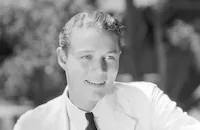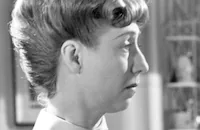Jennie
Cast & Crew
David Burton
Virginia Gilmore
William Henry
George Montgomery
Ludwig Stossel
Dorris Bowdon
Film Details
Technical Specs

Synopsis
Fritz Schermer, the stern patriarch of a German American Ohio family, will not allow his son Karl to accept a scholarship to study the violin with one of the finest teachers in Chicago because he wants him to work in the family shoe store when he finishes school. When George, Karl's older brother, announces that he would like to marry Jennie Collins, a cashier at the general store, Fritz agrees, but says that after the wedding, they should live with them. After they are married, Fritz becomes upset when Jennie encourages his third son Franz, a farmer, to grow flowers. Mother Schermer explains to Jennie that Fritz does not permit questioning of his authority and that it is best not to say anything. Later Jennie learns that Mother Schermer's family in Germany did not give her permission to marry Fritz because he was just a clerk at the time and have not communicated with her since. Jennie soon invites the Schermer daughters, Lottie, Clara and Amelia, to gossip at tea, but Fritz breaks up their fun and sends them to do their work. When Jennie complains to George and asks that they move to their own home, he reveals that he receives no salary, only room and board, from his job at the shoe store. Jennie then tells Fritz that she is going to have a baby and that George needs at least fifteen dollars a week. Strutting in anticipation of becoming a grandfather, Fritz offers George a salary of five dollars, which Jennie, although disappointed at first, accepts. When Lottie returns home late one night after a date with her secret boyfriend and Fritz questions her, she talks back to him, and he tells her to get out. Jennie comforts Mother Schermer, but tells George she is glad that Lottie is on the road to freedom. Sometime later, Lottie returns ill, having gone to Philadelphia and married, only to be left by her husband. Fritz refuses to allow her to stay, however, and when Jennie offers to take Lottie to a hotel, he orders Jennie and George to leave as well. Before she goes, Jennie calls Fritz a little man and expresses the hope that the others also will leave him. Jennie makes a hard bargain with a real estate agent for a broken-down house for her, George and Lottie to live in and buys furniture on the installment plan, but George then informs her that he walked out of his job after a fight with his father and has not been able to get another. With only enough money to last a month, Jennie tries a plan to break Fritz's will by encouraging his family to leave him. She recommends Clara to Mrs. Willoughby, who is opening a dress shop, and after learning about a farm available for no cash down and easy payments, tries to convince Franz to buy it; however, neither Clara nor Franz respond. A few months later, after the real estate agent gives them a week to pay their overdue rent, George learns from the doctor that Jennie is pregnant, and he argues with her that they should go back to his father, while she wants to hold out. Just then, Clara and Franz tell Jennie that they have decided to leave Fritz, and Jennie tells them that they have saved her marriage. Jennie visits Fritz and, by suggesting that they may move to Toledo and have Mother Shermer visit them, gets Fritz to offer George ten dollars a week. She turns it down, then tells George, who wants to accept the offer, but when Jennie, Clara, Franz and Lottie urge him not to, he agrees. A letter comes from Fritz offering George fifteen dollars a week, but Jennie rips it up and sends an answer that they will not accept less than twenty-five. Later, Mother Shermer interrupts the children's meal with news that Fritz has suffered a heart attack. Jennie goes to see him and calls his bluff, accusing him of faking the attack because his old way of bullying his family no longer works. He finally agrees to pay the twenty-five dollar a week salary, buy a fur coat for Elsa, endorse notes for Franz's farm and to provide violin lessons for Karl. When she next asks for thirty dollars a week for George, he bellows for her to get out, but then calls her back and asks her opinion of him. She kisses his forehead and tells him she will keep her eyes on him and will tell him later. She then reports to the family that Fritz will live. Later, as the family sings at the piano, Fritz pounds with his cane on the floor. Thinking the music to be displeasing to him, Elsa runs to his bedside but he asks her to open the door so that he can hear, and she kisses him.

Director
David Burton
Cast

Virginia Gilmore

William Henry

George Montgomery

Ludwig Stossel

Dorris Bowdon

Rand Brooks
Joan Valerie
Rita Quigley
Hermine Sterler
Harlan Briggs

Irving Bacon
Almira Sessions
Aldrich Bowker

Marie Blake
Effie Anderson
Harry Tyler
William Wills
Charles Tannen
Crew
Jasper Blystone
Harold Buchman
Lewis Creber
Richard Day
Al De Gaetano
Herschel
Harry M. Leonard
Thomas Little
Virgil Miller
Emil Newman
Maurice Rapf
E. Clayton Ward
Sol M. Wurtzel

Film Details
Technical Specs

Quotes
Trivia
Notes
The working title of this film was Heil, Jennie. Executive producer Sol M. Wurtzel decided to drop the word "Heil," according to publicity for the film. According to Daily Variety, the film originally was to be an anti-Nazi picture. According to publicity, this marked the return of Dorris Bowdon to the screen following her marriage to writer and producer Nunnally Johnson.












